
The Importance of Being Earnest, a Trivial Comedy for Serious People is a play by Oscar Wilde, the last of his four drawing-room plays, following Lady Windermere's Fan (1892), A Woman of No Importance (1893) and An Ideal Husband (1895). First performed on 14 February 1895 at the St James's Theatre in London, it is a farcical comedy depicting the tangled affairs of two young men about town who lead double lives to evade unwanted social obligations, both assuming the name Ernest while wooing the two young women of their affections.
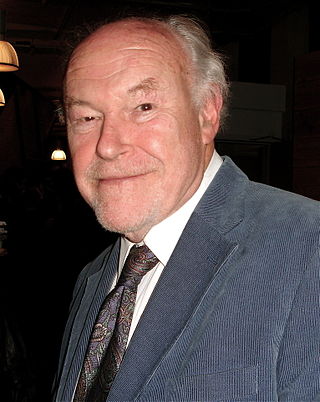
Timothy Lancaster West CBE FRSA was a British actor and director with a long and varied career across theatre, film, and television. He began acting in repertory theatres in the 1950s before making his London stage debut in 1959 moving on to three seasons with the Royal Shakespeare Company during the 1960s. During his life, West played King Lear and Macbeth (twice) along with other notable roles in The Master Builder and Uncle Vanya.
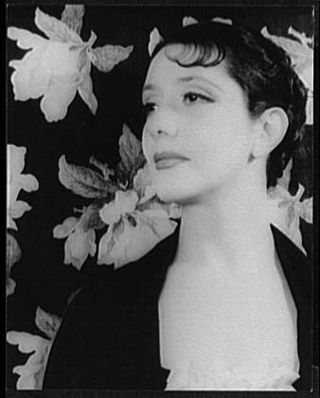
Lynn Fontanne was an English actress. After early success in supporting roles in the West End, she met the American actor Alfred Lunt, whom she married in 1922 and with whom she co-starred in Broadway and West End productions over the next four decades. They became known as "The Lunts", and were celebrated on both sides of the Atlantic.

The Comedy of Errors is one of William Shakespeare's early plays. It is his shortest and one of his most farcical comedies, with a major part of the humour coming from slapstick and mistaken identity, in addition to puns and word play. It has been adapted for opera, stage, screen and musical theatre numerous times worldwide. In the centuries following its premiere, the play's title has entered the popular English lexicon as an idiom for "an event or series of events made ridiculous by the number of errors that were made throughout".
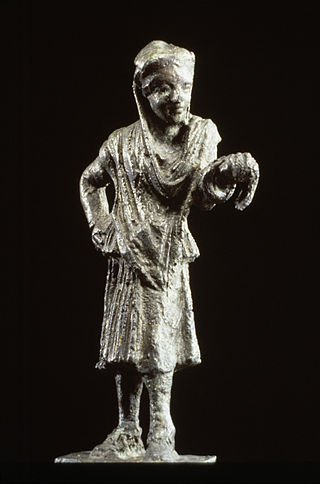
A theatrical culture flourished in ancient Greece from 700 BC. At its centre was the city-state of Athens, which became a significant cultural, political, and religious place during this period, and the theatre was institutionalised there as part of a festival called the Dionysia, which honoured the god Dionysus. Tragedy, comedy, and the satyr play were the three dramatic genres emerged there. Athens exported the festival to its numerous colonies. Modern Western theatre comes, in large measure, from the theatre of ancient Greece, from which it borrows technical terminology, classification into genres, and many of its themes, stock characters, and plot elements.

The Theatre Royal Haymarket is a West End theatre on Haymarket in the City of Westminster which dates back to 1720, making it the third-oldest London playhouse still in use. Samuel Foote acquired the lease in 1747, and in 1766 he gained a royal patent to play legitimate drama in the summer months. The original building was a little further north in the same street. It has been at its current location since 1821, when it was redesigned by John Nash. It is a Grade I listed building, with a seating capacity of 888. The freehold of the theatre is owned by the Crown Estate.

West End theatre is mainstream professional theatre staged in the large theatres in and near the West End of London. Along with New York City's Broadway theatre, West End theatre represents the highest level of commercial theatre in the English-speaking world. Seeing a West End show is a common tourist activity in London. Famous screen actors, British and international alike, frequently appear on the London stage.

The Shaftesbury Theatre is a West End theatre, located in Shaftesbury Avenue, in the London Borough of Camden. It opened in 1911 as the New Prince's Theatre, with a capacity of 2,500. The current capacity is 1,416. The title "Shaftesbury Theatre" belonged to another theatre lower down the avenue between 1888 and 1941. The Prince's adopted the name in 1963.

Ancient Greek comedy was one of the final three principal dramatic forms in the theatre of classical Greece. Athenian comedy is conventionally divided into three periods: Old Comedy, Middle Comedy, and New Comedy. Old Comedy survives today largely in the form of the eleven surviving plays of Aristophanes; Middle Comedy is largely lost, i.e. preserved only in relatively short fragments by authors such as Athenaeus of Naucratis; and New Comedy is known primarily from the substantial papyrus fragments of Menander.

The Criterion Theatre is a West End theatre at Piccadilly Circus in the City of Westminster, and is a Grade II* listed building. It has a seating capacity of 588.

Shakespeare's plays are a canon of approximately 39 dramatic works written by the English poet, playwright, and actor William Shakespeare. The exact number of plays as well as their classifications as tragedy, history, comedy, or otherwise is a matter of scholarly debate. Shakespeare's plays are widely regarded as among the greatest in the English language and are continually performed around the world. The plays have been translated into every major living language.
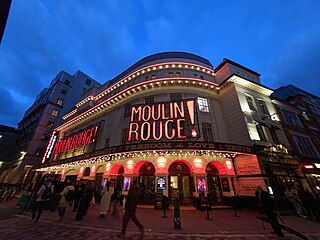
The Piccadilly Theatre is a West End theatre located at the junction of Denman Street and Sherwood Street, near Piccadilly Circus, in the City of Westminster, London. It opened in 1928.

The Lyric Theatre is a West End theatre in Shaftesbury Avenue in the City of Westminster. It was built for the producer Henry Leslie, who financed it from the profits of the light opera hit, Dorothy, which he transferred from its original venue to open the new theatre on 17 December 1888.

Daly's Theatre was a theatre in the City of Westminster. It was located at 2 Cranbourn Street, just off Leicester Square. It opened on 27 June 1893, and was demolished in 1937.

Edwardian musical comedy is a genre of British musical theatre that thrived from 1892 into the 1920s, extending beyond the reign of King Edward VII in both directions. It began to dominate the English musical stage, and even the American musical theatre, when the Gilbert and Sullivan operas' dominance had ended, until the rise of American musicals by Jerome Kern, Rodgers and Hart, George Gershwin and Cole Porter following the First World War.

Sir Noël Peirce Coward was an English playwright, composer, director, actor, and singer, known for his wit, flamboyance, and what Time magazine called "a sense of personal style, a combination of cheek and chic, pose and poise".

Drama is the specific mode of fiction represented in performance: a play, opera, mime, ballet, etc., performed in a theatre, or on radio or television. Considered as a genre of poetry in general, the dramatic mode has been contrasted with the epic and the lyrical modes ever since Aristotle's Poetics —the earliest work of dramatic theory.
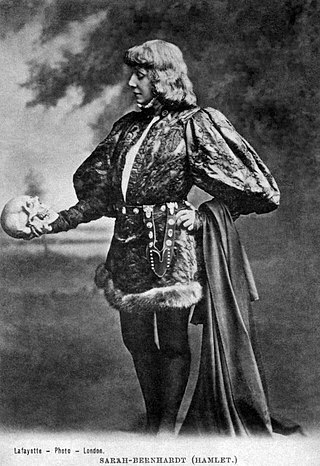
Theatre or theater is a collaborative form of performing art that uses live performers, usually actors or actresses, to present experiences of a real or imagined event before a live audience in a specific place, often a stage. The performers may communicate this experience to the audience through combinations of gesture, speech, song, music, and dance. It is the oldest form of drama, though live theatre has now been joined by modern recorded forms. Elements of art, such as painted scenery and stagecraft such as lighting are used to enhance the physicality, presence and immediacy of the experience. Places, normally buildings, where performances regularly take place are also called "theatres", as derived from the Ancient Greek θέατρον, itself from θεάομαι.

The Harold Pinter Theatre, known as the Comedy Theatre until 2011, is a West End theatre, and opened on Panton Street in the City of Westminster, on 15 October 1881, as the Royal Comedy Theatre. It was designed by Thomas Verity and built in just six months in painted (stucco) stone and brick. By 1884 it was known as simply the Comedy Theatre. In the mid-1950s the theatre underwent major reconstruction and re-opened in December 1955; the auditorium remains essentially that of 1881, with three tiers of horseshoe-shaped balconies.

Phoebe Mary Waller-Bridge is an English actress, screenwriter and producer. As the creator, head writer, and lead star of the comedy series Fleabag (2016–2019), she won various accolades, including three Primetime Emmy Awards, two Golden Globes and a British Academy Television Award. She received further Emmy and Golden Globe nominations for writing and producing the spy thriller series Killing Eve (2018–2022).



















